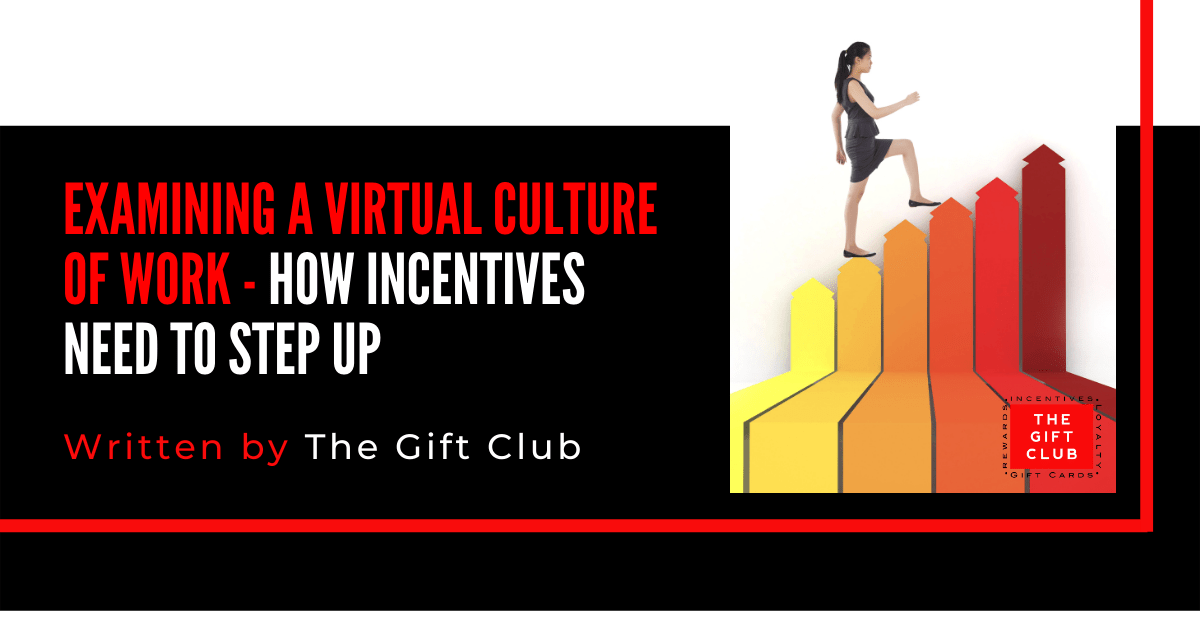by The Gift Club
In recent years, virtual workplaces have become increasingly common. Not only are remote teams becoming a more common occurrence, but how work is being done is changing. With advancements in technology, it’s now possible for people to work from anywhere in the world.
According to the Incentive Research Foundation there is a strong preference for remote work, with 41% of respondents indicating they would seek employment with another company if their current employers required a return to a physical workplace all or part of the time. — Blackhawk Network’s survey of 1,560 workers in the U.S. in August 2021
While this flexibility is great for employees, it can challenge managers and leaders. They need to find ways to motivate their team and get them on board with the new way of working. One way that leaders can do this is by offering special incentives in a remote culture. While incentives for teams are nothing new, how they’re delivered needs to change. In a virtual culture, leaders need to be more creative to get their team’s buy-in.
Incentive spending is up for 2022 (The IRF’s Industry Outlook for 2022). Overall incentive budgets are expected to increase by 34% and Per-person spend is increasing to $806 from $764 the prior year.
So how can employers create incentives that will work in a virtual culture? And what are some of the benefits of doing so?
The Rise of the Virtual Culture of Work
Every workplace builds a culture – whether it’s intentional or not. In fact, 94% of entrepreneurs believe that work culture plays a prominent role in a business’s success in the short and long term.
This culture results from the attitudes, values, and behaviours that are exhibited by employees.
When companies worked in person, building and nurturing a culture was easy. Leaders and managers could simply walk around the office and talk to employees. They could see how people were working and what was motivating them.
Now that work is done remotely, creating and nurturing culture is more difficult. Leaders can’t just walk around the office and talk to employees. They need to find ways to connect with all of their team and understand their motivations.
In order to do this, they need to create a virtual culture of work that has a wide reach and capabilities to deliver incentives.

Andy Schwarz, VP, Content & Communications, Incentive Research Foundation says, “As companies strive to retain and hire talent during The Great Resignation, incentive programs are expanding their reach to motivate the maximum number of employees and partners. Incentive programs are now expected to link employee behaviors to the firm’s pandemic recovery strategy, and that requires broad buy-in among employees and partners. While many incentive programs have traditionally focused on top performers, incentive programs in 2022 need to be more inclusive, with strategies to motivate remote and hybrid workers, part-time employees, and channel partners.”
Julie Barbier- Leblan, CEO of Merit Incentives, global engagement technology company based in Dubai, tells us “Incentives in a virtual culture do not have to be a challenge anymore. Digitalisation allows instant appreciation and encourages more collaboration and communication amongst employees. Merit Incentives believes not only in top-down recognition but also moving towards empowering the employees using peer-to-peer campaigns and features. We believe in creating an engaging company culture by allowing employees to recognise and reward each other. Hybrid work and flexible office attendances pushed companies to actively work on enhancing collaboration and recognition between team members across functions and countries with the use of monetary and non-monetary rewards and incentives.
In 2021, by introducing a peer to peer feature in our employee rewards platform for a healthcare client, the engagement ratio has jumped from 37% to 64% of registered users within the company while the number of nominations have increased by a frankly astounding 501%.
Merit Incentives overcomes the challenge of incentivisation in a virtual culture by encouraging a deeper understanding of the work and story-telling from anyone in the company and by driving the momentum through collaborative events and initiatives (both offline and online).”
What is a Virtual Culture of Work?
A virtual culture of work is a workplace where employees are able to work from anywhere in the world. It’s a place where the traditional office structure is replaced with remote teams that work together online.
In order to be successful, a virtual culture of work requires two things: 1) an effective way to connect team members and 2) the right incentives for employees.
The Rise of the 1:1
To better engage their employees and build a consistent culture across all of their offices, many companies are moving to a 1:1 model.
In a 1:1 model, each employee has a dedicated mentor who they meet on a regular basis. The mentor is someone who can help the employee with their work and with their career development.
The mentor-mentee relationship is a great way to build a culture of trust and communication. It’s also a great way to connect team members who are working remotely.
But are 1:1s enough to truly drive engagement in a virtual culture?

The answer is, unfortunately, no.
1:1s are great for developing relationships and for providing feedback, but they’re not enough to motivate employees.
In order to be successful in a virtual culture, you need to provide employees with a bit more. This can include incentives that are relevant to them and that they can work towards with passion.
Incentives are an essential way to show employees that you value their work and that you appreciate their contributions. They’re essential for motivating employees and building a strong culture in virtual culture.
What Makes an Incentive Work in a Virtual Culture?
Incentives are essential in any workplace, but they’re significant in virtual cultures.
That’s because, in a virtual culture, employees work independently. They’re not sitting in the same room as their co-workers, and they’re not getting regular feedback from their manager.
This can be a challenge for employees, especially if they’re not used to working remotely. In order to be successful, they need to be motivated by something other than face-to-face interaction.
We asked Alex Preece, CEO of Tillo, the rewards, incentives and gifting management platform, for his perspective: “There’s no doubt that rewards and incentives provide a wide range of benefits to an organisation – from improving employee engagement to retaining talent, creating a more positive work culture and improving your reputation. One thing that’s rarely emphasised enough is how happy employees drive increased customer satisfaction; by linking employee recognition to customer experience metrics, you can create a more customer-centric culture for your business as a whole.
It’s true that making incentives work virtually can be a challenge. However, that’s where digital incentives and rewards programmes can really make a difference. As a digital gift card platform, we power a number of employee reward and engagement platforms that enable employers to recognise and reward employee contributions, provide extra benefits, and create an element of delight and surprise.
To be successful in a hybrid world, incentive programmes need to be scalable, personalised and have a great user experience. They should be leveraged alongside (but not as a substitute for) the efforts of your entire organisation to create a collaborative, open and supportive culture across both digital and physical channels. For example, using a slack channel where team members are encouraged to share praise, hosting team events both virtually and physically, and asking employees for regular feedback.”
Three things could make an incentive work in a virtual culture: It has to be relevant to the team, it has to be achievable, and it has to be time-bound.
It Has to Be Relevant and Personalised
An incentive needs to be relevant to the team in order for it to be effective. It needs to appeal to them, and it needs to be something that they want to achieve. This means that it can’t be something that’s irrelevant or out of reach.
In Event Alternatives and their Impact on Culture, most experts interviewed believed their firms or client firms will leverage alternatives like points platforms, choice of merchandise, creative gifting experiences, gift cards, and individual or family experiences (including travel) as much or more than they did before the pandemic.
Husain Makiya , CEO of YouGotaGift, the leading digital gift card company in the Middle East, told us: “We have seen a significant uptake of Gift cards in the region (Middle East) when it comes to Employee incentives. From Oil & Gas giants to the Big 5 consultancy companies- everyone has experienced the seamless process through which incentives can be distributed – and in a fun way! Our employee rewards platform has seen corporates finding out interesting ways of rewarding employees- through meeting actual targets to spot rewards like best dressed on zoom meetings! The most important thing for any work reward or incentive being offered in a virtual culture is to make sure that it is something that A. They can truly benefit from, in a way that is unique to them, and B. It is something that is extremely accessible to line managers and HRs. It’s amazing how well you can support your virtual culture with the right tools at your disposal. Tie rewards up with business objectives, tie them up to organizational objectives as well; do not overlook tying them up to personal achievements and growth. Our people are working beyond the office, so we need to make sure we take care of them beyond the office as well.”
It Has to Be Achievable for remote workers
An incentive needs to be achievable in order for it to be effective. This means that it can’t be something that’s impossible for employees to achieve. It needs to be something that they can work towards, and it needs to be something that they can achieve in a reasonable amount of time.

As reviewed in the IRF’s 2021 study The Psychology of Points, points reward programs often reach the majority of the workforce, making them very effective at motivating performance across a much larger group. They are memorable and can create an enduring emotional impact on the workforce. The platform technology makes points program accessible to remote workers.
Incentives You Can Use in a Virtual Culture
There are many different incentives that you can use in virtual culture. Here are some examples:
1. Offer Praise
One of the best incentives you can offer in a virtual culture is praise. Praise your employees for their work and for their contributions. Don’t be afraid to find unique ways to bring forward the successes of individuals and teams for both project success as well as personal wins.
2. Offer Recognition
Another great incentive in a virtual culture is recognition. Recognize your employees for their work and for their contributions.
Recognition is similar to praise but helps to elevate individuals for practical and concrete contributions they have made to the company and the team. It’s also a great way to build a culture of trust and communication.

Andy continues “With a remote workforce, fostering a feeling of connectedness is an important part of any incentive program. Frequency is key to making employees feel like part of the team and encouraging desired behaviors. Consistent messaging in marketing communications keeps programs top-of-mind. Points or spot reward programs offering travel, merchandise, gift cards, time off, and other items can be used for frequent, broad-based recognition.”
3. Offer Monetary Rewards
Another great incentive in a virtual culture is monetary rewards. Offer your employees financial rewards for their work and their contributions.
Monetary rewards can often seem less than personal. Still, in a world where inflation is rising and individuals need financial help, these rewards can go far to bring up morale and motivation. Always connect monetary rewards to praise and recognition to enhance their effect.
Andy also says, “Gift cards are a great option for broad-based rewards. They are available in a variety of denominations, there is a wide variety of card types, and they can be delivered quickly and digitally to a remote workforce. Supervisors can use them for immediate spot rewards or to reward long-term goals. Employees can be offered the option to select the type of card — coffee, dining and clothing brands are popular this year. Then they have the choice of how and when to redeem their reward.”
4. Make them part of Employee Benefits
Given the importance of recruitment, retention, and engagement, incentive programs will be more important than ever. Dramatic hiring shifts are driving companies to examine how to be even more competitive in the job market, and a robust incentive program is an important part of a company’s full benefits package, according to the IRF.
5. Offer Training and Development Opportunities
Some incentives that you can offer in a virtual culture are training and development opportunities. Offer your employees training and development opportunities to help them grow their skills and their knowledge.
When you invest in training and development for your teams, you showcase that their growth and success matter. Their ability to rise in their roles is enhanced, and this support can only boost success rates.

6. Offer a Chance to be Part of a Team
Another great incentive in a virtual culture is the chance to be part of a team. Offer your employees the chance to be part of a team and work with other people.
When individuals feel that they are a part of something bigger than themselves, they will often rise above base expectations to create something truly remarkable. The relationships built in a team are invaluable – and will take your employer brand to new heights.
Enhance Your Incentives By Using The Gift Club
Today’s businesses must be agile and able to adapt to changes in the marketplace quickly.
This means that leaders and managers need to be able to manage their teams virtually, including how to praise, reprimand, coach, train, and deliver leadership through a screen.
Luckily, The Gift Club has a wealth of resources that can help you do just that!
Hosting an exclusive directory of incentive-based companies, The Gift Club is your go-to source for everything related to incentives and employee rewards.
We have brought together many of today’s top solutions and we are constantly adding new service providers and content to help you stay ahead of the curve.
Complete our contact form here if you are looking to be introduced to a selection of incentive providers and The Gift Club will be in touch or email info@the-gift-club.com




